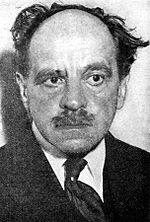Jakob Wassermann facts for kids
Quick facts for kids
Jakob Wassermann
|
|
|---|---|

Jakob Wassermann
|
|
| Born | 10 March 1873 |
| Died | 1 January 1934 (aged 60) Altaussee, Austria
|
| Nationality | German |
Jakob Wassermann (born March 10, 1873 – died January 1, 1934) was an important German writer. He wrote many novels, poems, and essays. He is best known for his novel The Maurizius Case. He also wrote about his life as a German and a Jew.
Contents
Early Life and Career
Jakob Wassermann was born in Fürth, Germany. His father was a shopkeeper. Sadly, Jakob lost his mother when he was very young. He showed a strong interest in writing early on. He published some of his first pieces in small newspapers.
His father did not want him to be a writer. So, after finishing school, Jakob started a short job with a businessman in Vienna. This job did not last long.
After serving in the military, he lived in southern Germany and Zurich. In 1894, he moved to Munich. There, he worked as a secretary. Later, he became a copy editor for a newspaper called Simplicissimus. A copy editor checks and corrects written text. During this time, he met other famous writers. These included Rainer Maria Rilke and Thomas Mann.
In 1896, he released his first novel, Melusine. The name "Wassermann" means "water-man" in German. A "Melusine" is a water spirit from old European stories.
Later Life and Challenges
From 1898, Jakob Wassermann worked as a theater critic in Vienna. In 1901, he married Julie Speyer. They divorced in 1915. Three years later, he married Marta Karlweis.
After 1906, he divided his time between Vienna and Altaussee in Styria, Austria.
In 1926, he was chosen to join the Prussian Academy of Arts. This was a big honor for writers. However, in 1933, he had to leave the Academy. He resigned just before the Nazis could kick him out. In the same year, his books were banned in Germany. This happened because he was of Jewish background.
Jakob Wassermann passed away on January 1, 1934. He died at his home in Altaussee from a heart attack.
Important Works
Wassermann wrote many different kinds of works. These included poetry, essays, novels, and short stories. His most important books are:
- The novel The Maurizius Case (Der Fall Maurizius, 1928).
- His autobiography, My Life as German and Jew (Mein Weg als Deutscher und Jude, 1921). In this book, he wrote about the difficult feelings of being both German and Jewish.
Some of his other notable works include:
- Melusine (Novel, 1896)
- The Dark Pilgrimage (Die Juden von Zirndorf, Novel, 1897)
- Caspar Hauser or The Laziness of the Heart (Caspar Hauser oder Die Trägheit des Herzens, Novel, 1908)
- The World's Illusion (Christian Wahnschaffe, Novel, 1919)
He also wrote a novel trilogy:
- The Maurizius Case (Der Fall Maurizius, 1928)
- Etzel Andergast (1931)
- Joseph Kerkhoven's Third Existence (Joseph Kerkhovens dritte Existenz, 1934)
Films Based on His Books
Several films have been made from Jakob Wassermann's novels:
- Christian Wahnschaffe (1920), directed by Urban Gad. This film was based on his novel Christian Wahnschaffe.
- The Masks of the Devil (1928), directed by Victor Sjöström. This movie was based on his novel Die Masken Erwin Reiners.
- On Trial (1954), directed by Julien Duvivier. This film was based on Der Fall Maurizius.
- Il caso Maurizius (1961). This was a TV miniseries based on Der Fall Maurizius.
- Der Fall Maurizius (1981). This was another TV miniseries based on Der Fall Maurizius.
Images for kids
See also
 In Spanish: Jakob Wassermann para niños
In Spanish: Jakob Wassermann para niños
 | William L. Dawson |
 | W. E. B. Du Bois |
 | Harry Belafonte |


